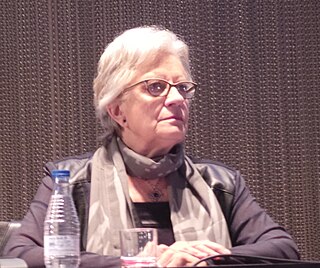 W
WCelia Amorós Puente is a Spanish philosopher, essayist and supporter of feminist theory. She is a key figure in the so-called equality feminism and focused an important part of her research in the building of relations between Enlightenment and feminism. Her book Hacia una crítica de la razón patriarcal constitutes a new outlook on the gender perspective of philosophy, revealing the biases of androcentrism and claims a critical review on behalf of women.
 W
WVictoria Camps is a Spanish philosopher and professor of ethics.
 W
WAdela Cortina is a Spanish philosopher born in Valencia, Spain.
 W
WMaría Goyri de Menéndez Pidal (1873–1955) was a Spanish Hispanist, literary critic, researcher, educator and advocate for women's rights. In 1896 she became the first Spanish woman to earn a degree in Philosophy and Letters and the first to earn her doctorate, in 1909, at a Spanish university. She was the wife of Ramón Menéndez Pidal.
 W
WAna de Miguel Álvarez is a Spanish philosopher and feminist. Since 2005 she has been a titular professor of Moral and Political Philosophy at King Juan Carlos University of Madrid. She directs the course History of Feminist Theory at the Complutense University of Madrid's Feminist Research Institute.
 W
WJuliana Morell was a Spanish Dominican nun and intellectual child prodigy. Some sources assert that she received a doctorate in canon law in Avignon in 1608. In 1941, Sylvanus Morley traced this to an 1859 misreading by Joaquín Roca y Cornet of 17th-century Latin documents. and cited others stating that, while her father wished for her to obtain a doctorate, she refused, regarding it as incompatible with her status as a nun.
 W
WEulalia Pérez Sedeño, is a philosopher, a specialist in science, technology, and gender and professor of investigation in the Department of science, technology and society of the Institute of Philosophy of the Higher Council of Scientific Research.
 W
WAlicia Helda Puleo García is an Argentine-born feminist philosopher based in Spain. She is known for the development of ecofeminist thinking. Among her main publications is Ecofeminismo para otro mundo posible.
 W
WOliva Sabuco de Nantes Barrera was a Spanish writer in holistic medical philosophy in the late 16th – early 17th century. She was interested in the interaction between the physical and psychological phenomena; therefore she wrote a collection of medical and psychological treatises that target human nature and explain the effects of emotions on the body and soul. She analyzed theoretical claims of ancient philosophers and wrote an early theory of what is now considered applied psychology.
 W
WTeresa of Ávila, born Teresa Sánchez de Cepeda y Ahumada, also called Saint Teresa of Jesus, was a Spanish noblewoman who felt called to convent life in the Catholic Church. A Carmelite nun, prominent Spanish mystic, religious reformer, author, theologian of the contemplative life and of mental prayer, she earned the rare distinction of being declared a Doctor of the Church, but not until over four centuries after her death. Active during the Catholic Reformation, she reformed the Carmelite Orders of both women and men. The movement she initiated was later joined by the younger Spanish Carmelite friar and mystic John of the Cross. It led eventually to the establishment of the Discalced Carmelites. A formal papal decree adopting the split from the old order was issued in 1580.
 W
WAmelia Valcarcel is a Spanish philosopher and feminist. She is considered within the “philosophic feminism” as part of the “equality feminism” approach. In 2015 she is a professor in Moral and Political Philosophy at the National University of Distance Education and since 2006 is member of the Spanish Council of State.
 W
WMaría Zambrano Alarcón was a Spanish essayist and philosopher associated with the Generation of '36 movement. Her extensive work between the civic engagement and the poetic reflection started to be recognised in Spain over the last quarter of the XX century after living many years in exile. She was awarded the Prince of Asturias Award (1981) and the Miguel de Cervantes Prize (1988).